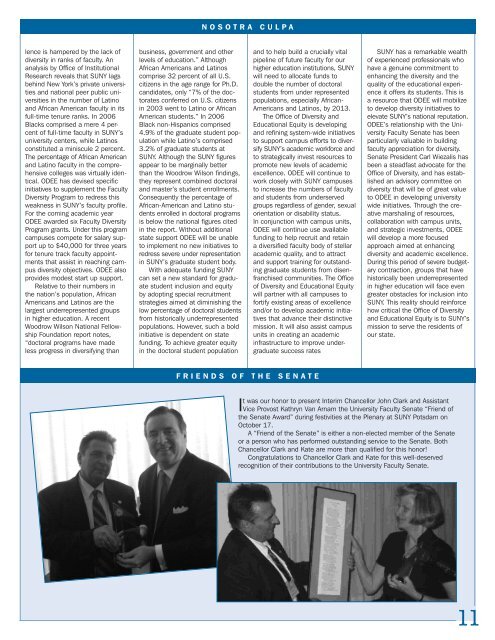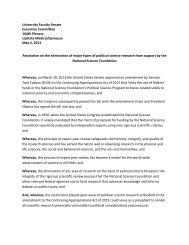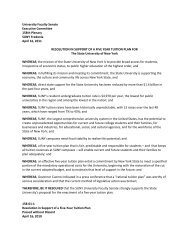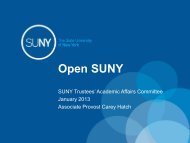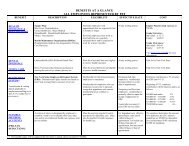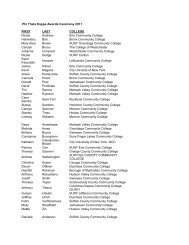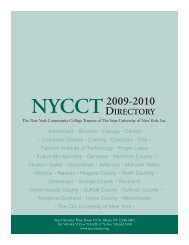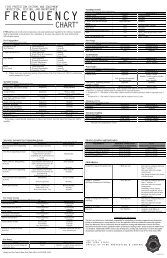Layout 1 copy - The State University of New York
Layout 1 copy - The State University of New York
Layout 1 copy - The State University of New York
You also want an ePaper? Increase the reach of your titles
YUMPU automatically turns print PDFs into web optimized ePapers that Google loves.
N O S O T R A<br />
C U L P A<br />
lence is hampered by the lack <strong>of</strong><br />
diversity in ranks <strong>of</strong> faculty. An<br />
analysis by Office <strong>of</strong> Institutional<br />
Research reveals that SUNY lags<br />
behind <strong>New</strong> <strong>York</strong>’s private universities<br />
and national peer public universities<br />
in the number <strong>of</strong> Latino<br />
and African American faculty in its<br />
full-time tenure ranks. In 2006<br />
Blacks comprised a mere 4 percent<br />
<strong>of</strong> full-time faculty in SUNY’s<br />
university centers, while Latinos<br />
constituted a miniscule 2 percent.<br />
<strong>The</strong> percentage <strong>of</strong> African American<br />
and Latino faculty in the comprehensive<br />
colleges was virtually identical.<br />
ODEE has devised specific<br />
initiatives to supplement the Faculty<br />
Diversity Program to redress this<br />
weakness in SUNY’s faculty pr<strong>of</strong>ile.<br />
For the coming academic year<br />
ODEE awarded six Faculty Diversity<br />
Program grants. Under this program<br />
campuses compete for salary support<br />
up to $40,000 for three years<br />
for tenure track faculty appointments<br />
that assist in reaching campus<br />
diversity objectives. ODEE also<br />
provides modest start up support.<br />
Relative to their numbers in<br />
the nation’s population, African<br />
Americans and Latinos are the<br />
largest underrepresented groups<br />
in higher education. A recent<br />
Woodrow Wilson National Fellowship<br />
Foundation report notes,<br />
“doctoral programs have made<br />
less progress in diversifying than<br />
business, government and other<br />
levels <strong>of</strong> education.” Although<br />
African Americans and Latinos<br />
comprise 32 percent <strong>of</strong> all U.S.<br />
citizens in the age range for Ph.D.<br />
candidates, only “7% <strong>of</strong> the doctorates<br />
conferred on U.S. citizens<br />
in 2003 went to Latino or African<br />
American students.” In 2006<br />
Black non-Hispanics comprised<br />
4.9% <strong>of</strong> the graduate student population<br />
while Latino’s comprised<br />
3.2% <strong>of</strong> graduate students at<br />
SUNY. Although the SUNY figures<br />
appear to be marginally better<br />
than the Woodrow Wilson findings,<br />
they represent combined doctoral<br />
and master’s student enrollments.<br />
Consequently the percentage <strong>of</strong><br />
African-American and Latino students<br />
enrolled in doctoral programs<br />
is below the national figures cited<br />
in the report. Without additional<br />
state support ODEE will be unable<br />
to implement no new initiatives to<br />
redress severe under representation<br />
in SUNY’s graduate student body.<br />
With adequate funding SUNY<br />
can set a new standard for graduate<br />
student inclusion and equity<br />
by adopting special recruitment<br />
strategies aimed at diminishing the<br />
low percentage <strong>of</strong> doctoral students<br />
from historically underrepresented<br />
populations. However, such a bold<br />
initiative is dependent on state<br />
funding. To achieve greater equity<br />
in the doctoral student population<br />
and to help build a crucially vital<br />
pipeline <strong>of</strong> future faculty for our<br />
higher education institutions, SUNY<br />
will need to allocate funds to<br />
double the number <strong>of</strong> doctoral<br />
students from under represented<br />
populations, especially African-<br />
Americans and Latinos, by 2013.<br />
<strong>The</strong> Office <strong>of</strong> Diversity and<br />
Educational Equity is developing<br />
and refining system-wide initiatives<br />
to support campus efforts to diversify<br />
SUNY’s academic workforce and<br />
to strategically invest resources to<br />
promote new levels <strong>of</strong> academic<br />
excellence. ODEE will continue to<br />
work closely with SUNY campuses<br />
to increase the numbers <strong>of</strong> faculty<br />
and students from underserved<br />
groups regardless <strong>of</strong> gender, sexual<br />
orientation or disability status.<br />
In conjunction with campus units,<br />
ODEE will continue use available<br />
funding to help recruit and retain<br />
a diversified faculty body <strong>of</strong> stellar<br />
academic quality, and to attract<br />
and support training for outstanding<br />
graduate students from disenfranchised<br />
communities. <strong>The</strong> Office<br />
<strong>of</strong> Diversity and Educational Equity<br />
will partner with all campuses to<br />
fortify existing areas <strong>of</strong> excellence<br />
and/or to develop academic initiatives<br />
that advance their distinctive<br />
mission. It will also assist campus<br />
units in creating an academic<br />
infrastructure to improve undergraduate<br />
success rates<br />
SUNY has a remarkable wealth<br />
<strong>of</strong> experienced pr<strong>of</strong>essionals who<br />
have a genuine commitment to<br />
enhancing the diversity and the<br />
quality <strong>of</strong> the educational experience<br />
it <strong>of</strong>fers its students. This is<br />
a resource that ODEE will mobilize<br />
to develop diversity initiatives to<br />
elevate SUNY’s national reputation.<br />
ODEE’s relationship with the <strong>University</strong><br />
Faculty Senate has been<br />
particularly valuable in building<br />
faculty appreciation for diversity.<br />
Senate President Carl Wiezalis has<br />
been a steadfast advocate for the<br />
Office <strong>of</strong> Diversity, and has established<br />
an advisory committee on<br />
diversity that will be <strong>of</strong> great value<br />
to ODEE in developing university<br />
wide initiatives. Through the creative<br />
marshaling <strong>of</strong> resources,<br />
collaboration with campus units,<br />
and strategic investments, ODEE<br />
will develop a more focused<br />
approach aimed at enhancing<br />
diversity and academic excellence.<br />
During this period <strong>of</strong> severe budgetary<br />
contraction, groups that have<br />
historically been underrepresented<br />
in higher education will face even<br />
greater obstacles for inclusion into<br />
SUNY. This reality should reinforce<br />
how critical the Office <strong>of</strong> Diversity<br />
and Educational Equity is to SUNY’s<br />
mission to serve the residents <strong>of</strong><br />
our state.<br />
F R I E N D S O F T H E S E N A T E<br />
I<br />
t was our honor to present Interim Chancellor John Clark and Assistant<br />
Vice Provost Kathryn Van Arnam the <strong>University</strong> Faculty Senate “Friend <strong>of</strong><br />
the Senate Award” during festivities at the Plenary at SUNY Potsdam on<br />
October 17.<br />
A “Friend <strong>of</strong> the Senate” is either a non-elected member <strong>of</strong> the Senate<br />
or a person who has performed outstanding service to the Senate. Both<br />
Chancellor Clark and Kate are more than qualified for this honor!<br />
Congratulations to Chancellor Clark and Kate for this well-deserved<br />
recognition <strong>of</strong> their contributions to the <strong>University</strong> Faculty Senate.<br />
11


